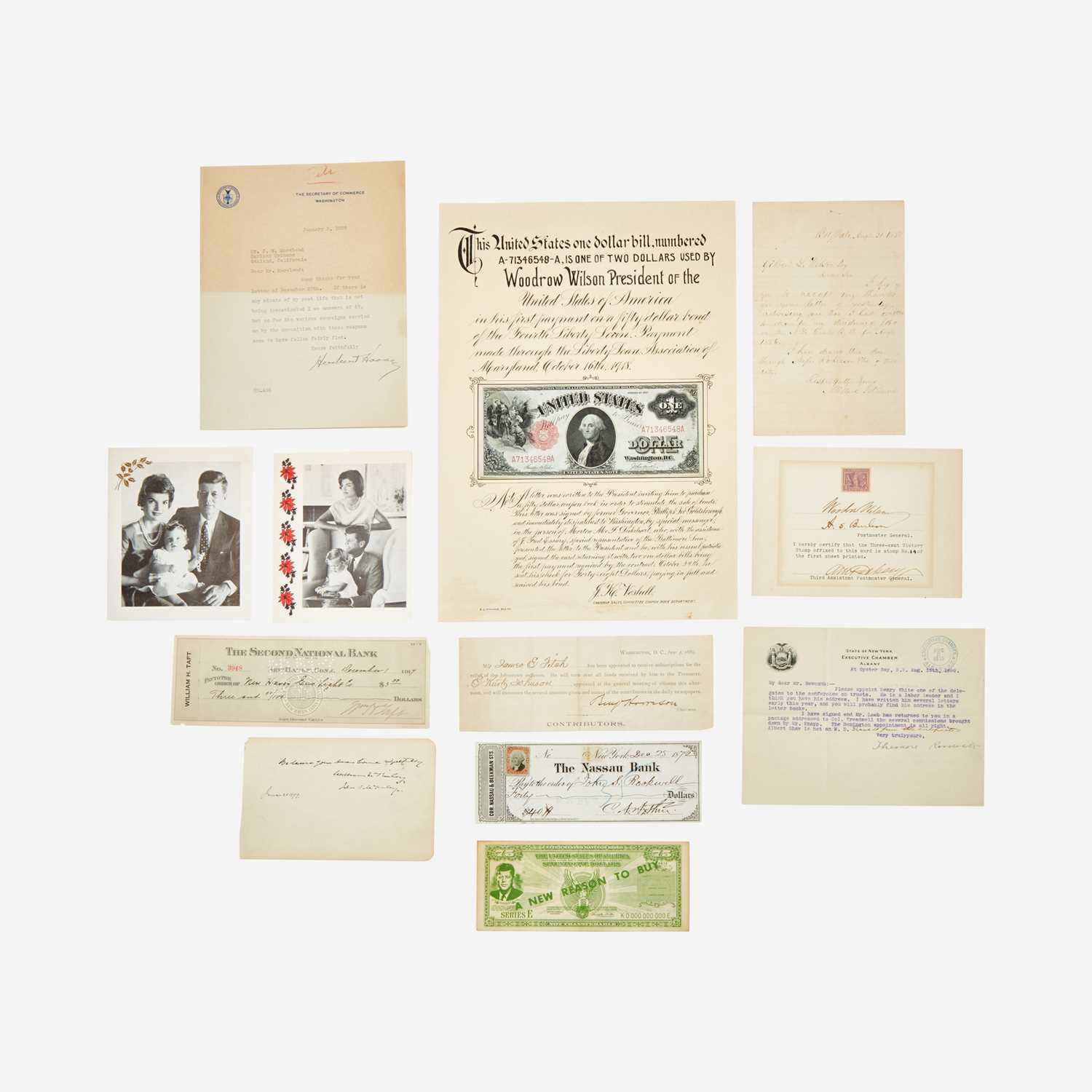WILSON. Woodrow. Typed document signed ("Woodrow Wilson"), as President, n.d. [ca. September 1918]. 3 pages, 4to, on White House stationery . "THE MEN IN THE TRENCHES...WILL...RETURN TO THEIR HOMES WITH A NEW VIEW AND A NEW IMPATIENCE" WILSON ON THE DANGERS AND POSSIBILITIES OF THE COMING POSTWAR ERA. President Wilson regrets that he cannot be at the Reorganization Banquet to which the party leaders of New Jersey had invited him. But he sends this striking message instead: a revealing expression of how radically the war had changed Wilson's thinking. He sees an urgent and vaguely dangerous mood among the electorate in the coming postwar era, especially among returning soldiers. "A time of grave crisis has come in the life of the Democratic party...every sign of these terrible days of war and revolutionary change, when economic and social forces are being released upon the world...bids us search our hearts through and through and make them ready for the birth of a new day...The old party slogans have lost their significance and will mean nothing to the voter of the future, for the war is certain to change the mind of Europe as well as the mind of America...The men in the trenches, who have been freed from the economic serfdom to which some of them had been accustomed, will, it is likely, return to their homes with a new view and a new impatience of all mere political phrases and will demand real thinking and sincere action...Let the Democratic party in New Jersey, therefore, forget everything but the new service which they are to be called upon to render" in the "days of political and economic reconstruction which are ahead..." The postwar peace settlement, the Versailles treaty, and the proposed League of Nations all came to dominate Woodrow Wilson's thoughts and energies after 1918, and nearly cost him his life. His intense focus on the need to reorder world affairs along the lines of his famous 14-points made domestic American political concerns seem almost absurdly irrelevant by comparison. It was precisely this single-mindedness that made him so unwilling to compromise with any of the Senate leaders who opposed his vision of a U. S. role in the League of Nations. The exhausting strain of Wilson's 1919 cross-country tour to sway public opinion in favor of the League hastened the stroke which incapacitated him for the final year and a half of his term.
WILSON. Woodrow. Typed document signed ("Woodrow Wilson"), as President, n.d. [ca. September 1918]. 3 pages, 4to, on White House stationery . "THE MEN IN THE TRENCHES...WILL...RETURN TO THEIR HOMES WITH A NEW VIEW AND A NEW IMPATIENCE" WILSON ON THE DANGERS AND POSSIBILITIES OF THE COMING POSTWAR ERA. President Wilson regrets that he cannot be at the Reorganization Banquet to which the party leaders of New Jersey had invited him. But he sends this striking message instead: a revealing expression of how radically the war had changed Wilson's thinking. He sees an urgent and vaguely dangerous mood among the electorate in the coming postwar era, especially among returning soldiers. "A time of grave crisis has come in the life of the Democratic party...every sign of these terrible days of war and revolutionary change, when economic and social forces are being released upon the world...bids us search our hearts through and through and make them ready for the birth of a new day...The old party slogans have lost their significance and will mean nothing to the voter of the future, for the war is certain to change the mind of Europe as well as the mind of America...The men in the trenches, who have been freed from the economic serfdom to which some of them had been accustomed, will, it is likely, return to their homes with a new view and a new impatience of all mere political phrases and will demand real thinking and sincere action...Let the Democratic party in New Jersey, therefore, forget everything but the new service which they are to be called upon to render" in the "days of political and economic reconstruction which are ahead..." The postwar peace settlement, the Versailles treaty, and the proposed League of Nations all came to dominate Woodrow Wilson's thoughts and energies after 1918, and nearly cost him his life. His intense focus on the need to reorder world affairs along the lines of his famous 14-points made domestic American political concerns seem almost absurdly irrelevant by comparison. It was precisely this single-mindedness that made him so unwilling to compromise with any of the Senate leaders who opposed his vision of a U. S. role in the League of Nations. The exhausting strain of Wilson's 1919 cross-country tour to sway public opinion in favor of the League hastened the stroke which incapacitated him for the final year and a half of his term.









.jpg)





Testen Sie LotSearch und seine Premium-Features 7 Tage - ohne Kosten!
Lassen Sie sich automatisch über neue Objekte in kommenden Auktionen benachrichtigen.
Suchauftrag anlegen